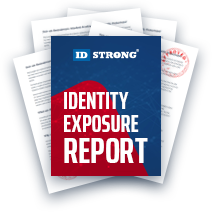Epsilon Opt-Out
Table of Contents
What is Epsilon?
Epsilon is a marketing solution that collects consumer household purchasing data; its services focus on finding consumers and building relationships with them. Epsilon uses aggregate information in its "household purchase database" to record and analyze consumer purchases as they happen. In the real world, consumers who consistently purchase things with cash likely have limited data exposed to Epsilon. In contrast, those using a card for every purchase or having rewards cards have significant details recorded by Epsilon.
Consumer and household purchasing power being known and studied by Epsilon can be beneficial. They work to provide a tailored marketing experience for consumers in their database. Epsilon's privacy policy describes this as a person buying children's clothes and then receiving a catalog for them; they create a consumer profile and then load it with whatever associated purchase information they can find. They then make reasonable assumptions about the household and focus adverts sent to them in a process called "profiling". Those consumers who want children's clothing catalogs make out well in this situation. However, this is not always the case.
Epsilon's marketing profiles are based on individual consumer purchases associated with a household address. Regarding adverts, a consumer may receive a children's clothing catalog after their purchase; they could receive a wine or customized check catalog after their spouse makes a separate purchase. They might receive a skateboard or car interest magazine after their neighbor enters the wrong address at a store. The consumer may even reach a certain age and be inundated with baby magazines and MLM propaganda. Consumers drowning in catalogs and targeted adverts are unlikely to see a reduction unless they take action. The best way to hinder the media mailed to the consumer is by requesting an opt out of Epsilon.
Before You Opt-Out of Epsilon
There are no requirements to opt out of Epsilon outside of contact details. An "opt out" for data brokerages refers to a formal request to remove specific information from "the services". In Epsilon's case, this means a request to strip consumer data away from applicable marketing teams. Not all consumers are entitled to this censorship, however. Only those who live in California and Virginia are entitled to a complete information opt out. For everyone else, privacy data requests come down to identity authorization.
Other data brokerages have two options to treat a successful opt out, like those who deal in consumer information. Those who do not maintain the information or records treat an opt out as a deletion request. It destroys all associated data with the consumer. Other data holders treat opt outs as suppression requests. Details remain aggregated to a consumer or household but are concealed from being actively used in services. Epsilon uses suppression methods for opt outs, as explained in their Consumer Information page below.
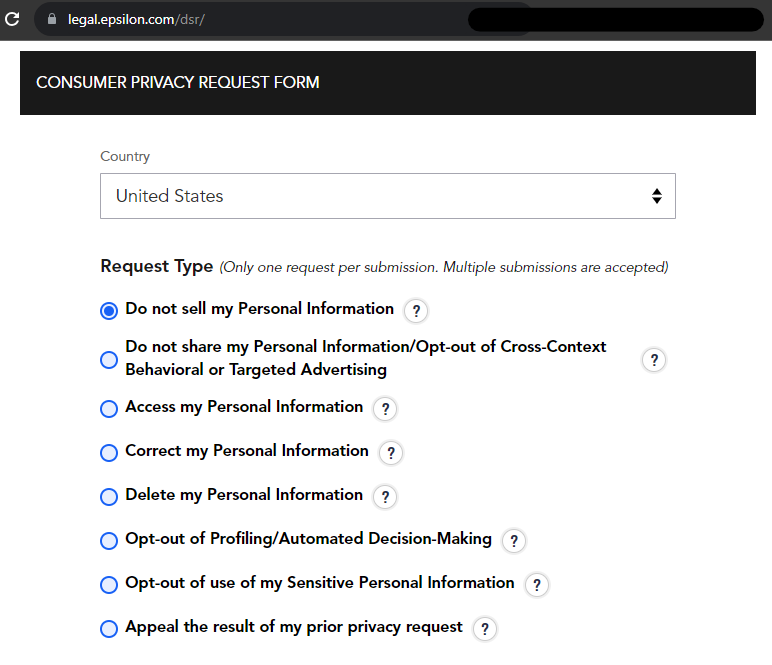
Opt outs treated with suppression methods are the best option for every consumer. The data is flagged and concealed with all associated parts; Epsilon has long-term data aggregation, so the status will stay on the consumer record for longer than usual. Most suppression statuses last a year. Notice, however, the highlighted portion in the screenshot above. Epsilon is not the originator of the data they analyze; they are a harvesting combine. They accept all data open to them, then parcel and organize it accordingly.
As a byproduct, some data may be incorrectly applied to a consumer or household; this is the impact of the skateboard or car magazine from the neighbor example above. Sometimes, an opted out consumer may have a new member erroneously attached to the household, resulting in additional adverts. Users must ask Epsilon directly to learn what consumers are considered a house member. This information, by extension, informs what past purchases or data influences current household advertisements. The guide below offers solutions to request a household summary report, to request an opt out, and to appeal judgments.
The Prelude to Your Epsilon Opt-Out
There are three ways to remove information from Epsilon. Consumers who know they have a household profile aggregated by Epsilon can call or email their request. Epsilon also offers an online option, which consumers can use to make many data privacy changes. The online form is also how consumers place assessment reports; these detail the household summary and what purchases influence resulting advertisements. Consumers needing to know if they have an Epsilon profile should request a household summary report. The summary mails after the request is submitted. However, knowing if the data is there is an overall time saver. If Epsilon does not have a household summary, there's nothing to opt out of, resulting in a rejection in most situations.
How to Remove Information from Epsilon: Step-by-Step
Request an Opt-Out Online Using Epsilon's Privacy Form
Consumers requiring live assistance can call 1-(866)-267-3861 to reach the Epsilon Privacy Department. Representatives answer calls Monday through Friday, 9:00 am to 6:00 pm EST. There are no menus to navigate, and calls are answered in the order they are received. Otherwise, consumers needing support can email the Epsilon care team at privacyofficer@publicisgroupe.com. Include a first and last name, an email, a residential address, city, state, and zip code. Tell them to "remove my name from Epsilon's services".
Alternatively, consumers can request an opt out with the online privacy form. Epsilon's Consumer Privacy Rights page is the only place a consumer can request data changes. The form offers many request types, and each does something specific. Their nuances impact how the associated information is treated. As mentioned above, consumers in some states are entitled to some options but not others.
All these details matter because consumers must make multiple requests to opt out of Epsilon entirely; only one request can be admitted at a time; if the wrong options are selected, Epsilon will keep the data active. Open the form in a new tab and scroll to the "Request Type" section.
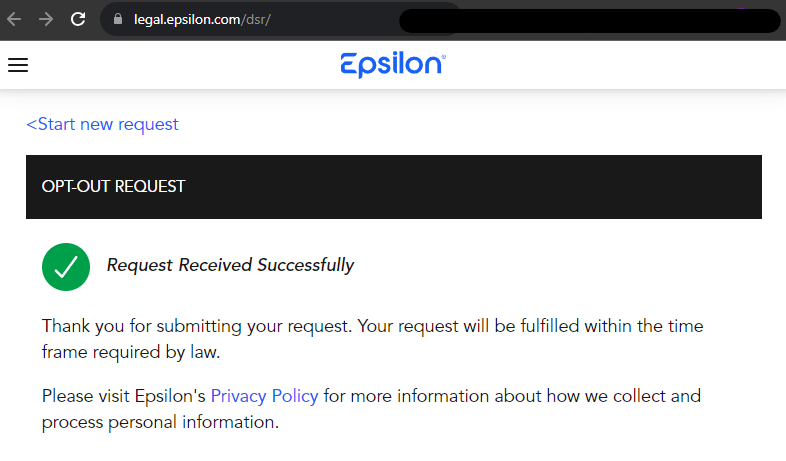
If no Request types appear, set the Country to the appropriate location or refresh the page. This form has many request options, each altering or interacting with consumer data. Depending on the situation, some forms may be more significant than others.
- Do not sell: an overall opt out; this selection asks that Epsilon stop drawing profit using consumer information.
- Do not share: a targeted opt out; this option stops Epsilon from promoting personalized ads when shopping online.
- Access: a browser option that allows users to see their data settings. These settings impact a specific browser.
- Correct: a browser option that allows users to change their data settings. These changes apply only to the consumer browser.
- Delete: a browser option that allows users to delete their data entirely. This only applies to the consumer browser data related to Epsilon.
- Opt-out of profiling: a targeted opt out, this option stops Epsilon from assuming the consumer wants catalogs concerning what they purchase.
- Opt-out of sensitive personal information: a targeted opt out; this selection stops Epsilon from using personally identifiable information as described in the CCPA.
- Appeal the results: Use this option to request a retrial. Although some consumers are entitled to the options above, all consumers can appeal the decision.
In the list above, the bold selections are necessary to have a full opt out. If all of them are used, the consumer will make four opt out requests. Not including the prior and after household summaries (suggested) or an appeal request if things sour. Luckily for the consumer, the form is always the same.
Step One
After opening the form, select Country and Request Type. Below the list, click the drop-down bar and choose a status. Most should answer "Consumer", though some agents may be in California.
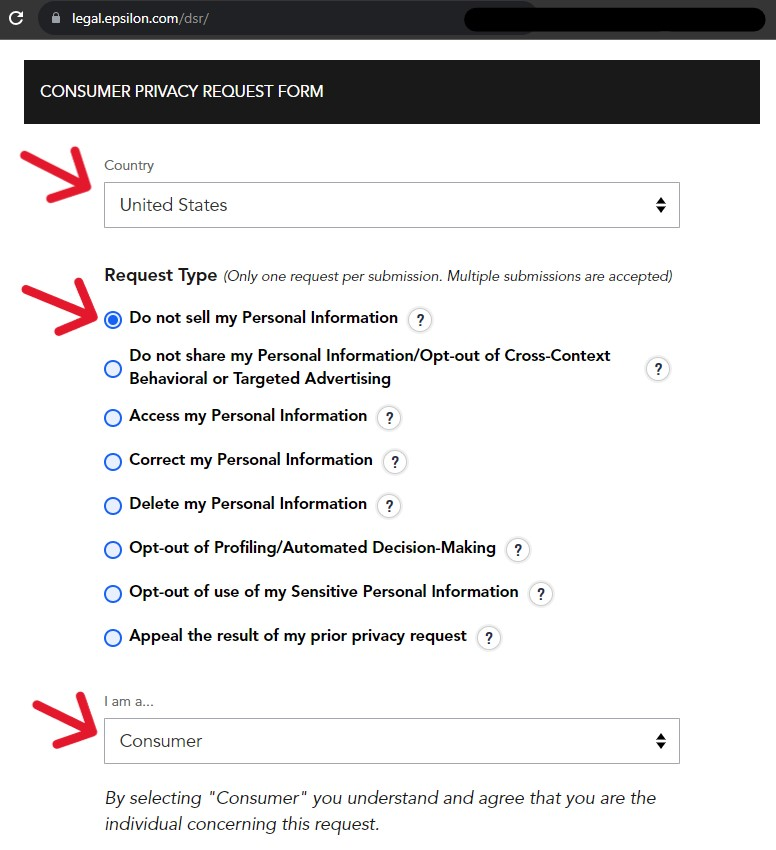
Step Two
Scroll down and enter an accessible email into the provided space. Submit a first and last name into the spaces, then add an address, city, state, and zip code. Click the blue "Submit Request" to finish.
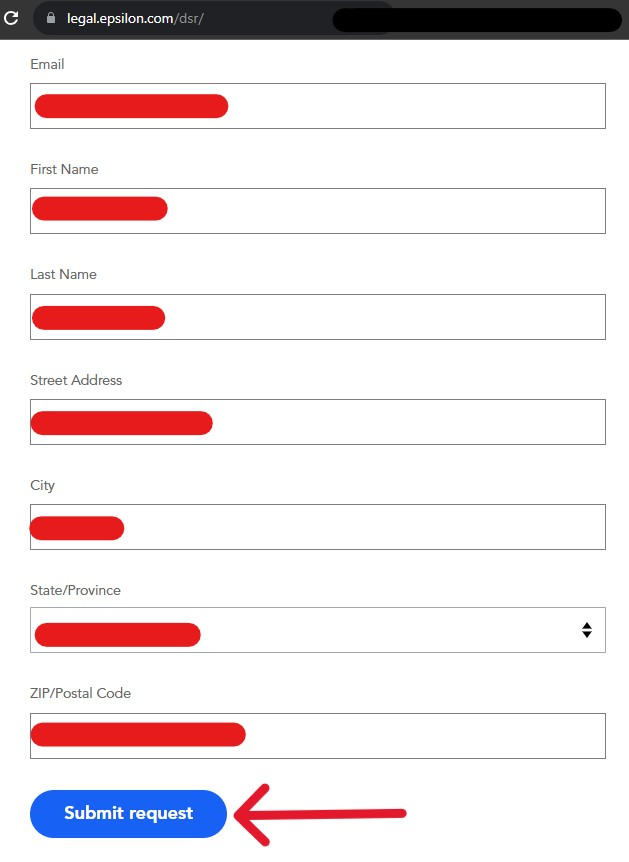
The following page shows a "Request Received Successfully" (or not) status. A representative must now choose to enact or reject the request. When enacted, consumers may not notice an immediate decline in physical adverts. This is due to the scheduling and database maintenance times of those marketers. It may take up to a year to feel the opt out's full impact.
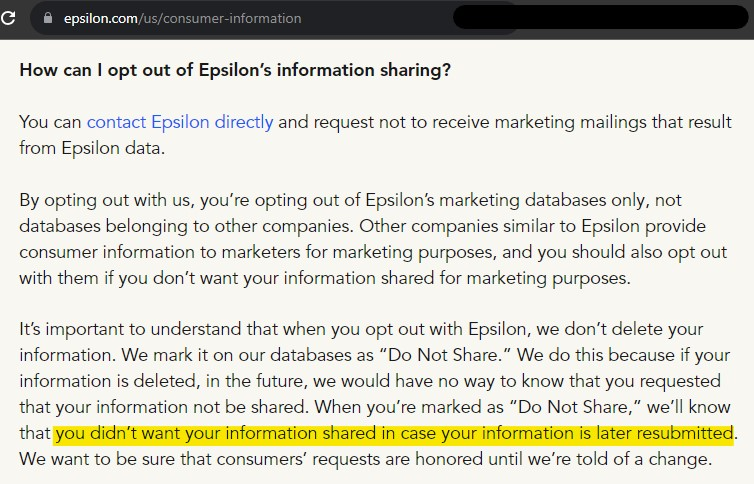
Verify the Changes are Successful
Consumers only know the information Epsilon has by requesting a summary of it. As mentioned above, the "Access my Personal Information" option on the form places this summary request. After receiving a confirmed opt out, users should return to ensure the changes are successful. Verify this by placing a summary request in the same process listed above. Returning to confirm the information is not "sold" is vital, as Epsilon sometimes de-identifies the data rather than suppresses it. De-identified data is not aggregated in association with a user and cannot be used for anything beyond analysis. This guide is current with the processes of opt out solutions provided by Epsilon's privacy policy (2023).
